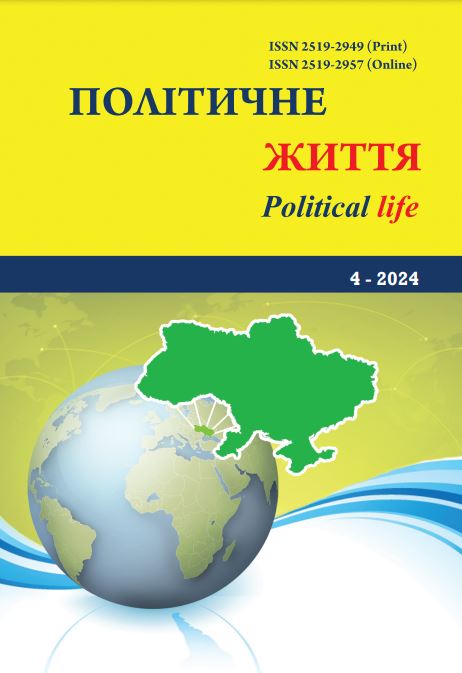Globalization and the challenge of the balance of power concept
DOI:
https://doi.org/10.31558/2519-2949.2024.4.18Keywords:
balance of power, deterrence, equilibrium, H. MorgenthauAbstract
The modern multipolar world brings to the forefront the study of the balance of power concept, which today requires rethinking. Anarchy and the distribution of spheres of influence, the decline of leftist movements and the rise of far-right ones, along with a wide network of terrorist organizations, indicate that strategies of deterrence and equilibrium need new approaches. In this article, the author questions the use of the terminology "balance of power." [Which is more commonly used in translation into Ukrainian not as "balance of power", but as "balance of strength"]. The English version more commonly uses the term "balance of power," thus this article allows for the balance of power to be examined not only within the context of military confrontation and nuclear weapons. The level of diplomacy and digital technologies today play an active role in international politics, creating a dividing line between spheres of dominance among countries. Hence, the variability, hard and soft balancing in the formation of a world order creates parity through compromise. This compromise never satisfies anyone, but it can serve as an agreed-upon rule of international behavior. Although such rules are primarily established by countries with nuclear weapons as a means of influence, the role of non-nuclear states is significant. Continuous balancing among nuclear alliances in order to protect national interests opens new opportunities for the balance of power concept. Here, the role of non-state organizations, national self-determination, financial-economic levels, and other factors can change the world order. In this study, the author analyzes the balance of power models of H. Morgenthau, which indicate the relevance of the status quo of third countries that influences the nature of the balance of power among alliances. The work demonstrates that the modern approach to analyzing the balance of power has undergone significant changes, as digitalization has a profound impact on strategies of deterrence and balance. Information operations and the war in Ukraine illustrate that traditional methods relying on military alliances are not always effective. Military alliances are adapting and evolving – some are trying to avoid direct military intervention, while others are doing so gradually. At the same time, the policies of sanctions and diplomatic pressure have not succeeded in halting Russian aggression. This indicates that the mechanism of collective security requires rethinking. The world is fragmenting, and there is a need for a set of scenarios that may work in one region and remain ineffective in another.
References
Велика українська енциклопедія. Баланс сил. URL: https://vue.gov.ua/Баланс_сил (дата звернення: 05.09.2024).
Максимець В. Концепція «балансу сил» в центрально-європейському регіоні крізь призму російської агресії проти України: теоретико-методологічні аспекти. Studia Politologica Ucraino-Polona. 2018. Вип.8. С.9 – 14.
Ми-Україна. Війна Ізраїлю та Хезболли: чому ЦАХАЛ заходить у Ліван і до чого це призведе. URL: https://weukraine.tv/article/vijna-izrajilju-ta-khezbolli-chomu-tsakhal-zakhodit-u-livan-i-do-choho-tse-prizvede/ (дата звернення: 30.09.2024).
Паніна І. Г. Дослідження миру: основні теоретичні перспективи. Політичне життя. 2022. №1. 92 – 107.
Федуняк С. Вплив російсько-української війни на діяльність провідних інститутів безпеки в контексті формування нової моделі міжнародних відносин. Медіафорум : аналітика, прогнози, інформаційний менеджмент: зб. наук. праць. Чернівці : Чернівецький нац. ун-т, 2022. Том 11. C. 131-140.
Alfarsi H. Balance of Power Theory: what is it and how is it maintained. Profolus. https://www.profolus.com/topics/balance-of-power-theory-what-is-it-and-how-is-it-maintained/ (date of access: 30.09.2024).
CNN: у пейджерах “Хезболли» були заміновані акумулятори. Радіо свобода. 27 вересня 2024. URL: https://www.radiosvoboda.org/a/news-khezbolla-peydzhery-vybukhivka-akumulyatory/33137707.html (дата звернення: 30.09.2024).
Morgenthau H. J. Politics among Nations: The Struggle of Power and Peace. N.Y.: Alfred A. Knopf, 1949. 421 p.

